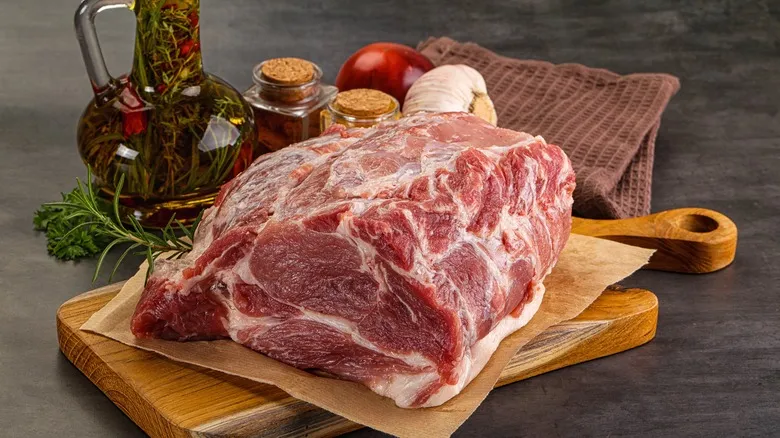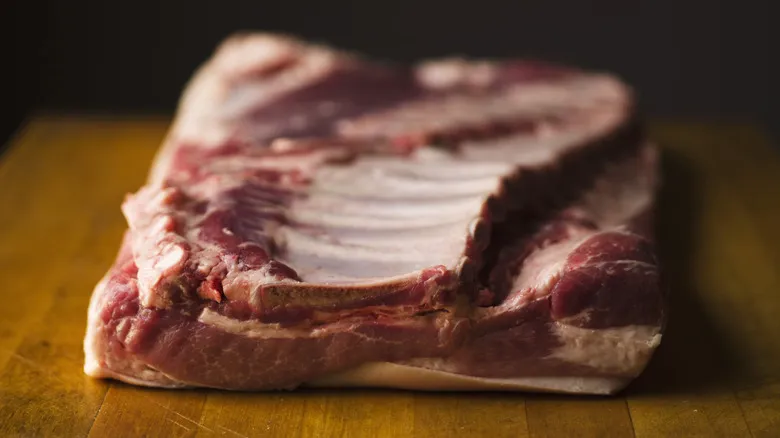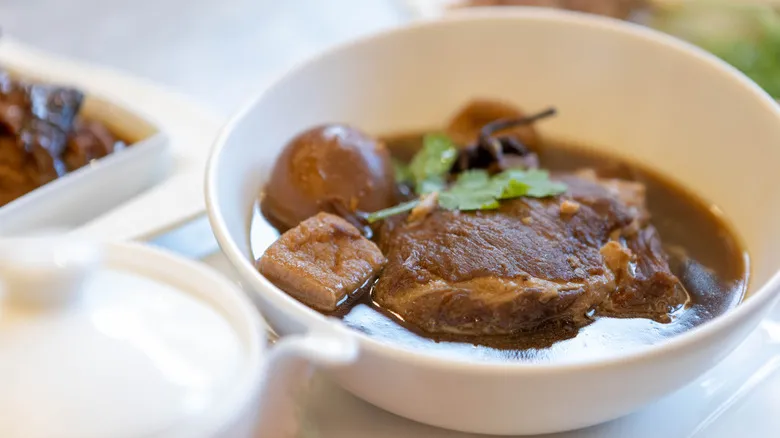Pork backbones and neck bones are perfect for soup stocks

If you're looking for a simple pork soup base, pork backbone is an excellent choice. This cut is abundant in meat, bone, and collagen, all in proportions that yield a flavorful stock without being overpowering. The resulting broth has a pleasant thickness, making for a hearty yet drinkable soup. Pork backbone is sourced from the same area as the ribs and consists of leftover pieces of the spine. While you may not have access to these scraps from home butchering, you can ask your local butcher for them at a reasonable price.
Another popular option is pork neck bones. These cuts are convenient scraps that naturally arise from the butchering process. Like backbones, pork neck bones are rich in collagen, providing a luxurious texture to soups and stews. With more meat attached, this cut benefits from an initial roasting or pan-frying to achieve caramelization, enhancing its flavor. When simmered over high heat, the resulting broth develops a creamy consistency. This is characteristic of Japan's tonkotsu ramen (not to be confused with torikotsu or tonkatsu) and Chinese-style pork broths. Given the rich culinary qualities of both backbones and neck bones, it's no wonder they are frequently used as a soup base in various cuisines.
Ribs and ham hock are excellent options for broths

It's quite common to specifically look for pork backbone and neck bones when making soup. While these cuts create a particularly well-balanced stock, you can also make a delicious soup using more readily available leftover cuts. For example, if you have uncooked meat intended for tender, fall-off-the-bone ribs, you can chop it into pieces to serve as a broth base. In Chinese and Southeast Asian cuisines, ribs are often combined with root vegetables to create a hearty soup. Because these broths have a higher meat-to-bone ratio, they tend to be milder, which is why they are frequently enhanced with additional vegetables and spices. Although it's less conventional, you can also utilize scraps from pork shoulder or butt that remain after butchering. Just be sure to include bones to add depth and flavor.
If you're aiming for a pork broth with a unique taste, consider using ham hocks. Even smoked pork remnants can be simmered into a fragrant soup. Similarly, bones left over from braises and roasts can serve as an excellent soup base. So, the next time you finish carving, freeze the leftovers for future use. Don't worry about impurities; it's perfectly normal to start your soup by parboiling the ingredients first. After some time on the stovetop or in a pressure cooker, you'll achieve a delicious result.
Reach for pork offal for rich flavor and nutrition

Don't overlook the potential of cartilage-rich offal when it comes to creating a hearty pork soup. For example, pig feet, often disregarded, can provide a robust broth. This cut is packed with bones, cartilage, tendons, and meat—a perfect combination for a thick and flavorful pork stock. If you allow a pig foot soup to simmer slowly and then cool, you'll notice a delightful gelatin formation. This quality is prized for its rich taste and texture, along with the health benefits of collagen.
Other offal that can enhance your soup stock includes pork tail, head, and organs such as liver, heart, and gizzards. These nutrient-dense and flavorful cuts, often thrown away, can add enticing flavors to your dishes. Use pork head for a particularly rich pozole, or mix pork offal with chicken stock and vegetables for a lighter broth. No matter which cut you choose, be sure to keep the skin on, and feel free to combine various pieces at once. Broths can easily be diluted, so if the flavor is too intense, you can easily mellow it out. Plus, these pork cuts are usually budget-friendly, making the cooking process less stressful.
Additionally, cartilage-rich offal is an excellent way to add depth to a pot filled with just bones or meat-heavy pork cuts. So, if you accidentally select the wrong pork cut, remember that making a stock is a great option. Simmer the cuts, and you'll be rewarded with a fragrant base perfect for all sorts of pork-based soups.
Recommended

The Case For Highlighting One Cheese On Your Next Cheese Board

Egg-In-A-Hole Grilled Cheese Is The Upgrade Your Sandwich Deserves

The Best Topping For Moist, Flavorful Veggie Burgers

What To Look For When Buying Sushi Grade Fish
Next up

